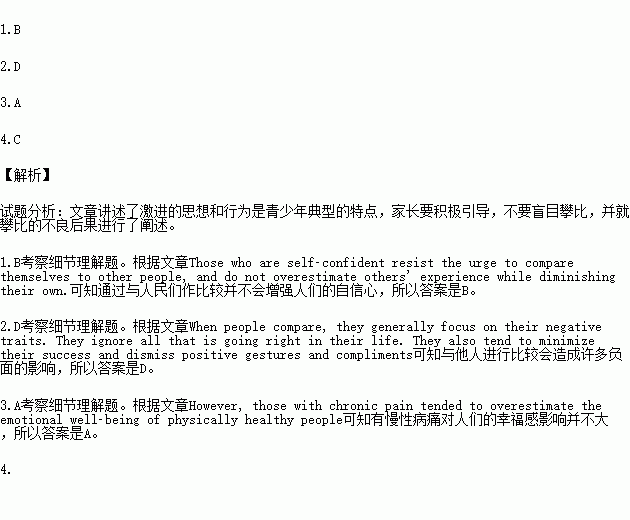题目内容
Comparative thinking and behavior is quite typical among teenagers, but it is the responsibility of the parent to set limits and hold firmly to them. Frequently, a parent will tell me in frustration about how their child has complained about not having the very best in fashion design like their friends, or the latest electronic gadgetry that all the other kids own.
Parents need to teach their children self?confidence. Those who are self?confident resist the urge to compare themselves to other people, and do not overestimate others' experience while diminishing their own. But some people may have a mantra signified by the slogan, if only. “If only I had the money of my brother; if only I was smart like my classmates; if only I was as good?looking as my friends.”
Comparing oneself with others is a trap. People who compare themselves with other individuals tend to feel that they are not good enough. They tend to perseverate(表现执拗)about their shortcomings. Even if they try their best,it is not good enough because they can always find someone who performs at a higher level. When people compare, they generally focus on their negative traits. They ignore all that is going right in their life. They also tend to minimize their success and dismiss positive gestures and compliments.
Those who are confident listen to their own inner voice. They are not influenced by other people's view of events. They are not overly impressed by others' success, money, health,and material possessions. They do not believe that others have a greater sense of emotional well?being than they do.
Recently, The Harvard Mental Health Letter published an article which indicated that people with chronic(慢性的)pain had as significant a sense of well?being as those without chronic pain. However, those with chronic pain tended to overestimate the emotional well?being of physically healthy people. The study confirmed that it is how we view events that is important, not the nature of our circumstances which may include making comparisons.
1. It seems that those who make comparisons don't________.
A. care about their success
B. have self?confidence
C. overestimate others' experience
D. understand others' success
2.The third paragraph mainly tells us________.
A. people tend to compare themselves to other individuals
B. those who make comparisons focus on their strengths
C. those who make comparisons don't deserve compliments
D. making comparisons can cause many negative effects
3.The article published in The Harvard Mental Health Letter indicates________.
A. chronic pain actually doesn't affect people's sense of happiness
B. physically healthy people have a higher sense of happiness
C. emotional health has nothing to do with physical health
D. what is important is the nature of events rather than our viewpoints
4. What is the author's attitude towards “making comparisons”?
A. Favorable. B. Unconcerned.
C. Disapproving. D. Doubtful.
书面表达
你的英语老师 (Miss Liu) 就“怎样使英语学习成为一件快乐的事? ”这个问题向全班同学征求建议。昨天, 全班同学就此进行了讨论。假设你是李华, 请你根据下表所提示的信息, 给英语老师写一封信, 报告你们的讨论情况并提出你的建议。
讨论情况 | 1. 课内互动 (师生或生生互动) 2. 课外活动 (演讲或晚会等) 3. 运用英语 (口头或书面交流) …… |
你的建议 | (请根据自己的经历与感想, 提出两至三点建议) |
注意:
1. 对所给要点逐一陈述, 适当发挥, 不要简单翻译;
2. 词数100个左右。开头和结尾已经写好, 不计入总词数。
参考词汇: 互动的interactive
Dear Miss Liu,
Yesterday the whole class had a discussion on how to make learning English relaxing and fun.
________________________________________________________________________________
________________________________________________________________________________
________________________________________________________________________________
________________________________________________________________________________
________________________________________________________________________________
________________________________________________________________________________
Best wishes.
Yours,
Li Hua

